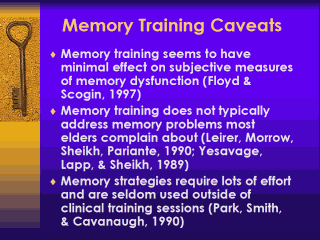 |
Some caveats that come up on memory training in general.
Memory training seems to have minimal effect on subjective measures of memory dysfunction.
What Iíve been mentioning all the way through that what people come in complaining about
is not often what they are being trained on. Memory training does not typically address
memory problems that most elderly complain about. And memory strategies require lots of
effort and are seldom used outside of clinical training sessions. And I found this to be
true with a variety of clinical populations also that people are much more able to apply
simple strategies that they can use, note books, preplanning, than to try intervening with
some complicated method or other kind of mnemonic strategies that they have rehearsed in a
clinic. Itís hard work to apply that and especially when you are out in a conversation
in the community. |
